Benchmarks: File Copy Test
|
Core i7 Test System Specs - Intel Core i7 965 Extreme Edition (Overclocked @ 3.70GHz) - x3 2GB G.Skill DDR3 PC3-12800 (CAS 9-9-9-24) - Asus P6T Deluxe (Intel X58) - OCZ GameXStream (700 watt) - Samsung Spinpoint F1 1TB 7200rpm HDD - Intel X25-M 160GB (2nd Gen) - G.Skill Falcon II - OCZ Vertex 128GB - OCZ Vertex Limited Edition 100GB - OCZ Vertex 2 Pro 100GB - HIS Radeon HD 5750 (1GB) Software - Microsoft Windows 7 Ultimate (64-bit) - ATI Catalyst 10.3 |
For testing purposes we first ran each SSD through HD Tach's full disk benchmark, which fills the drive with a single contiguous file and thus forces a block rewrite for every successive write request. This was done to simulate the degradation problem that SSDs without support for the TRIM function are likely to face.
The OCZ Vertex 2 100GB performed in much the same way after we ran the full disk benchmark as it does support the TRIM function and it appears to work well.


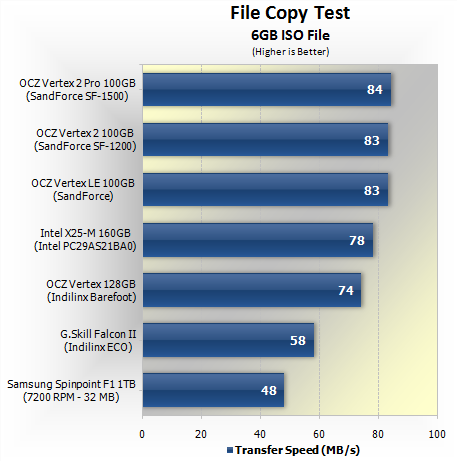
The above graphs show the time it took to duplicate a 6GB ISO file on disk as well as the throughput in megabytes per second. As you can see, the SandForce SSDs all took around 73-74 seconds to complete this task, while the Intel X25-M took 79 seconds and the original Vertex drive using the Indilinx Barefoot controller took 83 seconds. The slowest drive of course was the conventional hard drive, which took 127 seconds to complete the task.
When looking at the throughput we see that the Vertex 2 sustained 83MB/s, making it slightly faster than the Intel X25-M which produced an average transfer rate of 78MB/s. These are impressive figures when compared to the 48MB/s produced by the Samsung hard drive. In this test the Vertex 2 was 12% faster than the original Vertex as it provided 9MB/s better performance.
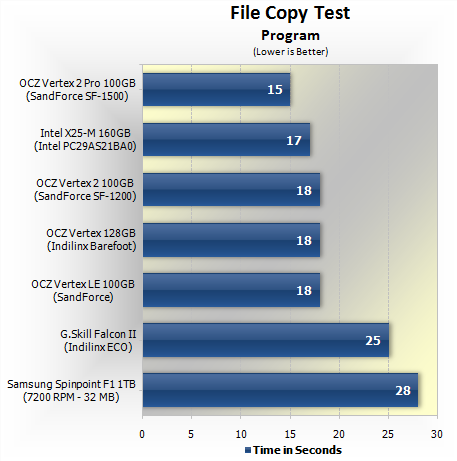
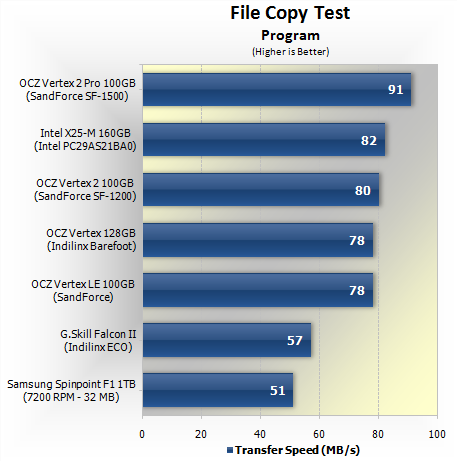
The program copy test is made up of many small non-compressed files. This is where SSDs typically struggle and in the past cheaper drives have proven to be slower than traditional hard drives. However, we seem to be past that state with the SandForce, Intel and Indilinx controllers. The enterprise-class OCZ Vertex 2 Pro was particularly fast here taking just 15 seconds to complete the task with a throughput of 91MB/s.
Next best was the Intel X25-M, taking 17 seconds with a transfer rate of 82MB/s, making it only a fraction quicker than the Vertex 2, which took 18 seconds with a throughout of 80MB/s. This made OCZ's latest drive just 2.5% faster than the original Vertex SSD, which worked out to be 2MB/s.
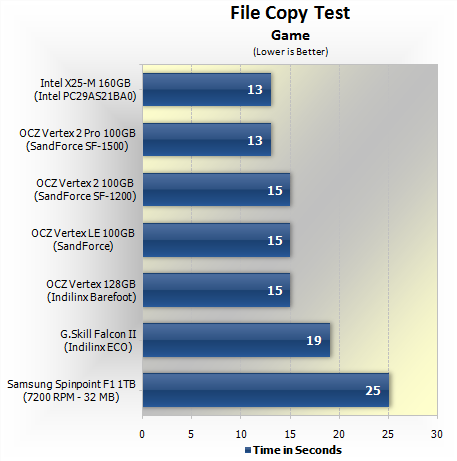
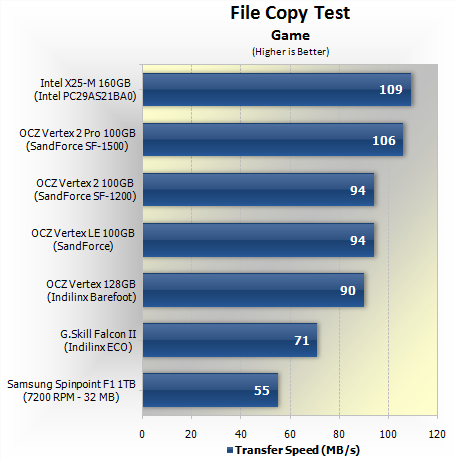
The game copy evaluation comprises of a mixture of small and large files. Here the Vertex 2 matched the performance of the Vertex LE, both taking 15 seconds to complete the test with a throughput of 94MB/s.
This made both drives slower than the Intel X25-M, which was the best performing drive, beating even the Vertex 2 Pro. Again the Vertex 2 was only a fraction faster than the original Vertex SSD, delivering 4% better performance.